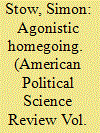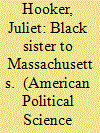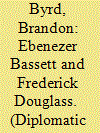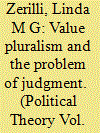| Srl | Item |
| 1 |
ID:
105195


|
|
|
|
|
| Publication |
2010.
|
| Summary/Abstract |
What does the furor over the "politicization" of Coretta Scott King's funeral reveal about contemporary black mourning practices? What does it reveal about black political thought, rhetoric, and practice? Identifying two key modes of mourning and their concomitant conceptions of democracy, this article situates the funeral within a tradition of self-consciously political responses to loss that played a significant role in abolitionism and the struggle for civil rights. Tracing the tradition's origins, and employing the speeches of Frederick Douglass as an exemplar, it considers the approach's democratic value and the consequences of its failure. Arguing that the response to the King funeral indicates that the tradition is in decline, the article locates causes of this decline in significant changes among the black population and in the complex consequences of the tradition's previous successes. It concludes by considering the decline's potentially negative impact, both for African Americans and for the broader political community.
|
|
|
|
|
|
|
|
|
|
|
|
|
|
|
|
| 2 |
ID:
143140


|
|
|
|
|
| Summary/Abstract |
The aim of this article is to read Frederick Douglass as a theorist of democracy. It explores the hemispheric dimensions of Douglass' political thought, especially in relation to multiracial democracy. Douglass is generally viewed as an African-American thinker primarily concerned with U.S. politics, and the transnational scope of his ideas is rarely acknowledged. Instead, this article traces the connections between Douglass’ Caribbean interventions and his arguments about racial politics in the United States. It argues that Douglass not only found exemplars of black self-government and multiracial democracy in the Caribbean and Central America, he also sought to incorporate black and mixed-race Latin Americans in order to reshape the contours of the U.S. polity and challenge white supremacy. Viewed though a hemispheric lens Douglass is revealed as a radically democratic thinker whose ideas can be utilized to sketch a fugitive democratic ethos that contains important resources for contemporary democratic theory and comparative political theory.
|
|
|
|
|
|
|
|
|
|
|
|
|
|
|
|
| 3 |
ID:
189489


|
|
|
|
|
| Summary/Abstract |
Scholarship in the field of Black history by scholars such as Carol Anderson, Gerald Horne, and Brenda Gayle Plummer has spurred the remaking of the study of U.S. foreign relations. In the late twentieth century, Plummer was at the forefront of this change; her scholarship drew needed attention to how the field of diplomatic history was traditionally stifled by its preoccupation with presidents, diplomats, and other white male agents of the U.S. state and by its near universal exclusion of African Americans.1 Specialists in U.S. and global Black history such as Keisha N. Blain have since been among the most influential scholars in further democratizing diplomatic history.2 Their scholarship has shown how myriad African Americans identified similarities between their fight against Jim Crow at home and the struggle for decolonization abroad and demonstrated how Black institutions and protest organizations shaped U.S. foreign policy, particularly with emerging African nations. It has shown the reciprocal nature between U.S. racial politics and foreign relations, especially in an era when the United States identified liberal civil rights reform as a way to improve its international image and increase its geopolitical power.
|
|
|
|
|
|
|
|
|
|
|
|
|
|
|
|
| 4 |
ID:
109939


|
|
|
|
|
| Publication |
2012.
|
| Summary/Abstract |
This essay examines the significantly different approaches of John Rawls and Hannah Arendt to the problem of judgment in democratic theory and practice.
|
|
|
|
|
|
|
|
|
|
|
|
|
|
|
|